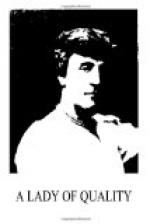“By Gad!” said one over his cups, “there are things even a rake-hell fellow like me cannot do; but he does them, and seems not to know that they are to his discredit.”
There had been a time when without this woman’s beauty he might have lived—indeed, he had left it of his own free vicious will; but in these days, when his fortunes had changed and she represented all that he stood most desperately in need of, her beauty drove him mad. In his haunting of her, as he followed her from place to place, his passion grew day by day, and all the more gained strength and fierceness because it was so mixed with hate. He tossed upon his bed at night and cursed her; he remembered the wild past, and the memory all but drove him to delirium. He knew of what stern stuff she was made, and that even if her love had died, she would have held to her compact like grim death, even while loathing him. And he had cast all this aside in one mad moment of boyish cupidity and folly; and now that she was so radiant and entrancing a thing, and wealth, and splendour, and rank, and luxury lay in the hollow of her hand, she fixed her beauteous devil’s eyes upon him with a scorn in their black depths which seemed to burn like fires of hell.
The great brute who dashed, and plunged, and pranced beneath her seemed to have sworn to conquer her as he had sworn himself; but let him plunge and kick as he would, there was no quailing in her eye, she sat like a creature who was superhuman, and her hand was iron, her wrist was steel. She held him so that he could not do his worst without such pain as would drive him mad; she lashed him, and rained on him such blows as almost made him blind. Once at the very worst, Devil dancing near him, she looked down from his back into John Oxon’s face, and he cursed aloud, her eye so told him his own story and hers. In those days their souls met in such combat as it seemed must end in murder itself.
“You will not conquer him,” he said to her one morning, forcing himself near enough to speak.
“I will, unless he kills me,” she answered, “and that methinks he will find it hard to do.”
“He will kill you,” he said. “I would, were I in his four shoes.”
“You would if you could,” were her words; “but you could not with his bit in your mouth and my hand on the snaffle. And if he killed me, still ’twould be he, not I, was beaten; since he could only kill what any bloody villain could with any knife. He is a brute beast, and I am that which was given dominion over such. Look on till I have done with him.”
And thus, with other beholders, though in a different mood from theirs, he did, until a day when even the most sceptical saw that the brute came to the fray with less of courage, as if there had at last come into his brain the dawning of a fear of that which rid him, and all his madness could not displace from its throne upon his back.
“By God!” cried more than one of the bystanders, seeing this, despite the animal’s fury, “the beast gives way! He gives way! She has him!” And John Oxon, shutting his teeth, cut short an oath and turned pale as death.




